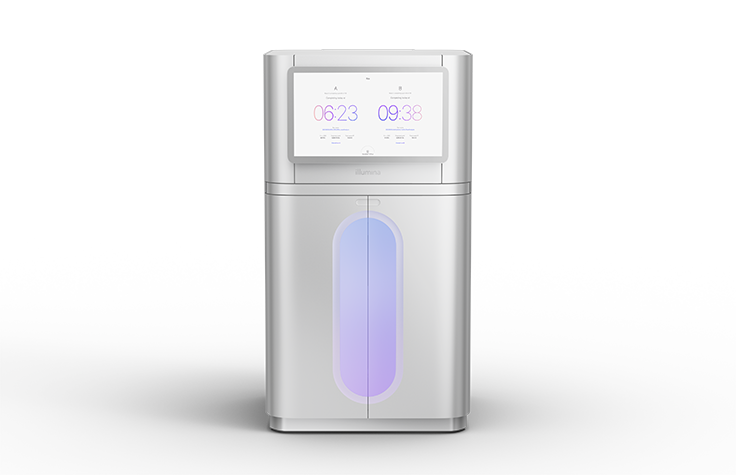
Order the NovaSeq X Series
Advanced chemistry, optics, and informatics combine to deliver exceptional speed and data quality, outstanding throughput and scalability.
Our virtual courses provide an overview of NGS. You’ll learn about sequencing workflows, sample prep, data analysis, and more.
Interested in learning more about next-generation sequencing technology and how you can use it in your research? Our virtual training classes are a great way for beginners to learn about how NGS works, key differences compared to Sanger sequencing and other technologies, NGS workflow steps, and how to analyze your data.
To ensure you get the most out of the course material, we offer introductory classes based on your specialty or area of interest:
In this class, you’ll learn about next-generation sequencing technology and each step of a sequencing workflow. We’ll go over considerations for experimental design, how to choose a sample preparation method and sequencer, and important things to consider during data analysis.
Learn about next-generation sequencing technology and each step of a sequencing workflow, with a focus on RNA. We’ll go over considerations for experimental design, how to choose a sample preparation method and sequencer, and important things to consider during data analysis.
With next-generation sequencing technology, pathologists can now evaluate vast amounts of tissue data in great detail while saving time, tissue samples, and cost. This virtual course provides an overview of NGS technology, workflow steps, and data analysis with a focus on pathology applications.
In this class, Microbiologists will learn about next-generation sequencing technology and the advantages of NGS applications with a particular focus on WGS and 16S. We’ll go over considerations for experimental design, how to choose a sample preparation method and sequencer, and important things to consider during data analysis.
So your new instrument is installed, your library is ready and now you have started to produce some sequencing data…but what does it all mean? If you’d like to learn more about sequencing data analysis on an example of DNA analysis workflow, this training is for you! You’ll learn the basics of data analysis workflows, how to evaluate and troubleshoot, how to generate, evaluate and manipulate FASTQ files, and much more.
Each class consists of (3) 3.5 hr. online sessions offered over the course of 3 days (total 10.5 hrs.). All sessions are highly interactive with demos and hands-on activities.
View upcoming class schedules and availability
Note: Once you find an upcoming class that works with your schedule, you’ll need to come back to this page to purchase.
Next-Generation Sequencing (NGS)
Discover the broad range of experiments you can perform with next-generation sequencing, and find out how Illumina NGS works.
Next-Generation Sequencing for Beginners
These educational resources cover key topics in next-generation sequencing designed for beginners.
These next-generation sequencing tutorials are designed to help you understand key concepts in NGS.
A dedicated support section is not currently available for this product
Intro to Next Gen Sequencing: DNA-Remote
20046837
Three, 3.5 hr. online sessions held over three days (10.5 hr. total) to familiarize new users with Illumina NGS technology and applications and steps in an NGS workflow. Course provides considerations for experimental design, choosing a sample preparation method and sequencing system, and data analysis challenges. The minimum number of the participants per training is four. NOTE: Next Gen in the short description should be hyphenated.
List Price:
Discounts:
Intro to Next Gen Sequencing: RNA-Remote
20060629
Three, 3.5 hr. online sessions held over three days (10.5 hr. total) to familiarize new users with an NGS workflow with a focus on RNA. Course provides considerations for experimental design, choosing a sample preparation method and sequencing system, and data analysis challenges. The minimum number of the participants per training is four. NOTE: Next Gen in the short description should be hyphenated.
List Price:
Discounts:
Intro to Next Gen Seq: Pathology-Remote
20060630
Three, 3.5 hr. online sessions held over three days (10.5 hr. total) to familiarize new users with an NGS workflow with a focus on pathology applications. Course provides considerations for experimental design, choosing a sample preparation method and sequencing system, and data analysis challenges. The minimum number of the participants per training is four. NOTE: Next Gen in the short description should be hyphenated.
List Price:
Discounts:
Intro to NGS: Microbiologists-Remote
20060631
Three, 3.5 hr. online sessions held over three days (10.5 hr. total) to familiarize new users with an NGS workflow with a focus on WGS and 16S. Course provides considerations for experimental design, choosing a sample preparation method and sequencing system, and data analysis challenges. The minimum number of the participants per training is four.
List Price:
Discounts:
Intro to Data Analysis-Remote
20060632
12 hr. total of online sessions held over three days to familiarize users with data analysis workflows. Course provides evaluation and troubleshooting, generating, evaluating, and manipulating FASTQ files, secondary analysis metrics, and related topics. The minimum number of the participants per training is four.
List Price:
Discounts:
Showing of
Product
Qty
Unit price
Product
Catalog ID
Quantity
Unit price
Reach out for information about our products and services, or get answers to questions about our technology.
Your email address is never shared with third parties.